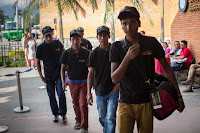Political, economic and social context
In 2018, the political situation in the Philippines still deteriorated in comparison to the previous year, as the Philippino government, under the guise of an all-out war against drug lords and terrorists, continued its crackdown on civil society organisations, human and labour rights activists and indigenous people. The martial law which was imposed in Mindanao in 2017 was extended to the whole region of Visayas and to Bicol (as the so-called ‘State of Lawlessness’), raising concerns that soon it will cover the whole of the Philippino territory. Heavy military operations have also been expanding, while military officials have been placed in key government positions.
Social activism, mobilization and organising of workers becomes increasingly difficult and dangerous, due to a climate of indiscriminate violence and extrajudicial killings. The administration passed the Tax Reform for Acceleration and Inclusion Act (TRAIN), which sparked a lot of protest from progressive labour and pro-poor organisations, as the excise tax on oil products contributed to the rise of inflation in 2018 (up to 6,7% in October 2018). The tax reform and subsequent sharp rise in the price of basic commodities affected mostly poor workers who have to get by on a daily minimum wage (in Manila) of 512 pesos (±8,2 euro).
 |
| Medical staff in Manila hospital |
"My name is Rose Ann. I have been employed as a laboratory technician grade 1 for four years now but by training am a medical technologist. While I was applying for a better suited and paid position of medical technologist 2, I was charged with a case to pay 35.000PHP (600€) for some spilled reagent. The Alliance of Health Workers’ union in our hospital met with the head of the laboratory and found out that the chief of the department wanted to give the position I was applying for to his niece, who was still had to pass her final exams. It seems he didn’t want to give me, the current laboratory technician, the position but he wanted to wait for his niece to pass the board exam and give it to her.AHW filed a complaint and notified the director of this potential abuse, and four of us health workers got promoted to medical technologist grade 2. The hospital also acquitted me of the 35.000PHP, determining the real cause was a malfunctioning of the machine indicator, while I had correctly followed the Standard Operating Procedure."Act against the privatization of public hospitals, health facilities and health services
In three hospitals, AHW could negotiate an ‘end-of-the-year-incentive’ of 25.000 pesos (±430 euro). In two other hospitals, 475 health workers – nurses as well as administrative staff – could be regularized.
Health workers and their organizations, among which the Alliance of Health Workers, obtained a (small) success in the House of Representatives with the passing of the ‘Act prohibiting the privatization and corporatization of public hospitals, public health facilities and public health services’ which states that “the State has to ensure the protection and promotion of the right to health of the people and to make essential goods, health and other services available to all people at affordable cost”. No public hospital, health facility or health service shall be privatized and 90% of total bed capacity in public hospitals has to be allocated to indigent/poor patients. However, the law can only be enacted when a similar bill is being introduced and passed in the Senate.













